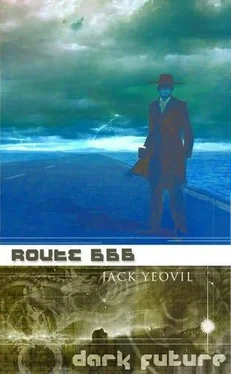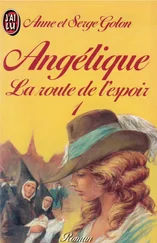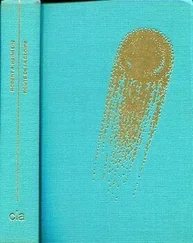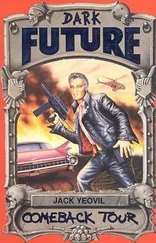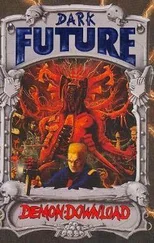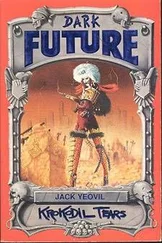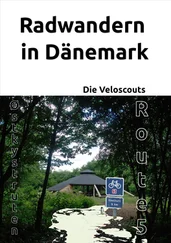Jack Yeovil - Route 666
Здесь есть возможность читать онлайн «Jack Yeovil - Route 666» весь текст электронной книги совершенно бесплатно (целиком полную версию без сокращений). В некоторых случаях можно слушать аудио, скачать через торрент в формате fb2 и присутствует краткое содержание. Жанр: Фантастика и фэнтези, на английском языке. Описание произведения, (предисловие) а так же отзывы посетителей доступны на портале библиотеки ЛибКат.
- Название:Route 666
- Автор:
- Жанр:
- Год:неизвестен
- ISBN:нет данных
- Рейтинг книги:3 / 5. Голосов: 1
-
Избранное:Добавить в избранное
- Отзывы:
-
Ваша оценка:
- 60
- 1
- 2
- 3
- 4
- 5
Route 666: краткое содержание, описание и аннотация
Предлагаем к чтению аннотацию, описание, краткое содержание или предисловие (зависит от того, что написал сам автор книги «Route 666»). Если вы не нашли необходимую информацию о книге — напишите в комментариях, мы постараемся отыскать её.
Route 666 — читать онлайн бесплатно полную книгу (весь текст) целиком
Ниже представлен текст книги, разбитый по страницам. Система сохранения места последней прочитанной страницы, позволяет с удобством читать онлайн бесплатно книгу «Route 666», без необходимости каждый раз заново искать на чём Вы остановились. Поставьте закладку, и сможете в любой момент перейти на страницу, на которой закончили чтение.
Интервал:
Закладка:
"Now, which of you bright souls can tell your ol' Quince what are the extremes o' the Celsius scale?"
"Zero degrees and a hundred degrees," Tyree said. "The boiling and freezing points of water."
"Take a gold star and go to the head of the class, Leona m'love. For hundreds o' years, we used Fahrenheit which no one could figure. The idea of Celsius is that the scale stretches between the two easiest-to-remember temperatures."
Actually, the gauntlet thermometer could read off in Celsius or Fahrenheit.
"Now, you watch that pot o' cursed God recaff."
Quincannon squeezed his meaty hand into Yorke's gauntlet and picked up the hot pot. The glove was proof against anything short of an oxy-acetylene torch. Flipping open the lid, Quincannon shifted the pot from embers to a still-burning patch. Flames licked up around it, soot streaks clawing the sides.
The Quince dipped a finger into the brown liquid and stirred, making a disgusted face. Burnside played variations on "Whiskey in the Jar", an Andrei Tarkovsky hit from the '70s. Within a minute, the recaff was bubbling and spitting.
"You'll stain my glove," Yorke protested.
Quincannon waved him back with his free hand.
"Worry not, the bounty of the United States is unlimited. Now, you'll agree that this foul brew is boiling?"
"Yes."
"Literally, boiling?"
Steam soaked the gauntlet. Angry bubbles burst on the surface. Liquid slopped over the side and dried to cracked paint.
"Sure."
"Then, me bright boy, take a look at yer man, the thermometer."
It read 92 degrees. Yorke tried to figure out the trick.
"That's not water. That's recaff."
"Good lad, well thought. The boiling point o' water polluted with this rotted poison should be slightly above 100 degrees Celsius."
Yorke's head hurt. Tyree huddled over the fire, flame-shadows on her face, red light in her eyes, peering in fascination at the experiment.
"Last time I tried this little stunt, boiling point was 94 degrees Celsius."
"Well," Yorke said, "92 is still plenty hot enough."
"Did you find this out yourself?" Tyree asked.
The Quince laughed. "No, it was one o' those funny items at the ass-end of Lola Stechkin's Newstrivia bulletin one night a couple o' months back. I just put it to the test."
"Is freezing point affected?"
"Now how would I be knowing that?"
Quincannon pulled his hand out of the pot and gave Yorke back the gauntlet. The index finger was thoroughly browned.
"I'm sorry, me boy. It looks like a cesspit dipstick."
"What does it mean?" Tyree asked, brow furrowed.
Quincannon shrugged again, "Lower fuel bills? The end o' the world?"
Out in the desert, something began whining in answer to Burnside's tune. Yorke found himself shivering.
ZeeBeeCee's Nostalgia Newstrivia:
The 1970s
Tonight, giving his first major tele-interview in ten long annos, we have one of the seminal voices, faces and butts of the '70s. Ask anybody over forty, and they'll be sure to recall that droopy tache, that craggy grin and that battered balalaika. Nobody embodied the ideals and failings of the dream decade more than the style-setting, chart-topping, Soviet singer-songwriter, Andrei Tarkovsky. Born in Moscow on 4 April 1932 – he's a moody Aries, fillettes – Andrei studied at the Institute of Oriental Languages and the All-Union State Jazz and Blues School before taking his first gig in 1954, as a geological prospector in Siberia. Two long, cold annos rooting through frozen ground provided him with the material for his autobiographical first album. There Will Be No Leave Today, in 1959. In the '60s, he was in the mainstream of Soviet pop music, receiving official approval and Union-wide acclaim for the seminal beetroot beat platters Ivan's Childhood and Ikons. It was only as the wave of the Sove Sound hit big in the '70s that Andrei became the irrepressible and outrageous rebel he remains into the '90s.
No matter how gray that moustache, wrinkly those crags or out-of-tune that balalaika, Andrei is still the genius of gloom, internationally hailed by his nickname "the Purge". Each new departure, new religion or new marriage hits headlines. Before Andrei sits in the Moscow Mud Pit with our chirrupy interactive diva, Lynne Cramer, let's listen to his first international colossus, from that atomic year of 1972, "Solaris"…
"Sooo-laris, oh-oh,
Po-laris, oh-oh, oh-oh,
Watch the mushrooming clouds
Blot out the vanishing crowds …"
Lynne: For poprock fans too young to remember the dim and distant pre-wrinkle days of 1972, "Solaris" and "Polaris" were the first nuclear weapons used in battle since 1945, deployed by First Secretary Leonid Brezhnev, who was the Kremlin Top Kat, in answer to the use of scurvy bioweapons by Mao Zedong, head honcho of the Peep's Republic of China. Andrei-Babe, at the time you wrote and recorded the song, you were a Red Army reservist. Did this inspire your strong and, at the time, unusual anti-war stance?
Andrei: Oh yes, Lynne. Moscow in those days was a wild and crazy city and the young were pleasure-seekers trailing in the wake of the idols of the day. Petya Jerkussoff was starting his so-called career and his fans ran riot, spraying his name all over the metro and committing colourful suicide in the streets. There were those of us who thought them mishkins, but the lotus eaters didn't listen to us. There was faction-fighting between the fans of trivial pop and those of us who yearned for a more serious, philosophical approach. They called us the "Glums" and we called them the "Glits". On Soviet Tankmen's Day we would all head to the shores of the Black Sea for an open-air concert and always there would be clashes between Glums and Glits. 1972 was the year it came to a head, with the mass suicide of the Kamchatka Chapter of Jerkussoff s fan club. As the war in Vietnam turned nuke, the cloud of death really did hang over us all. We Glums were proved correct. There was more to worry about than pimples and hollow cheeks.
Tragically, many boys who thronged to my concerts did not live out the year. Over a million died on both sides of the Sino-Soviet border, rendering vast land-tracts uninhabitable for the next century. It was time to be out on the streets, protesting. We chanted slogans like "Ivan, Come Home", "Hell Niet, Don't Go to Viet" and "War is Bloody Bad". I first sang "Solaris" at a rally in Red Square and the next day Comrade Brezhnev, with typical good humour, ordered I be called up and packed off to the killing zone. He specified that my duties involve searching irradiated areas for dog-tags. A few short annos before, I was awarded the Tchaikovsky Medal and the Order of Dizzy Gillespie for Ikons and Brezhnev hummed my tunes when drunk in public. Now I was a dissident, on the dreaded Shit List. I was inspired to write my great hit song, "The Times, They Are A-Stinking".
Lynne: You never went to the war, though?
Andrei: There was a well-established underground railroad for those who resisted militarisation. Like so many other evaders, I was smuggled into Finland. Since I was a public figure, moves were made for my extradition but I kept moving. I visited the West, though I found it gray and poor and not to my taste. It was a great tragedy to me to come to America, land of my musical heroes, to find nobody remembered Chuck Berry or Little Richard or Elvis Presley. All the kids in Detroit and Baltimore were buying Petya Jerkussoff records.
I continued to record and release material. I played concerts for those in exile. When Poland withdrew from the Warsaw Pact, I shared the stage, for the only time in my life, with the dreary Petya. He insisted he top the bill, but I showed him up by delivering a twenty-minute encore of "Solaris" that finished as I set fire to my balalaika and did a cossack dance in the flames. He was too busy crying with shame to best that. My discs were samizdat, circulated underground in the Soviet Union, but I understand kids would pass them from hand to hand and listen in defiance of official rulings. Many were executed by the KGB for crimes no worse than owning a proscribed "Solaris" single. Of course, execution might be thought to be too lenient for those who wasted their roubles on Petya Jerkussoff platters…
Читать дальшеИнтервал:
Закладка:
Похожие книги на «Route 666»
Представляем Вашему вниманию похожие книги на «Route 666» списком для выбора. Мы отобрали схожую по названию и смыслу литературу в надежде предоставить читателям больше вариантов отыскать новые, интересные, ещё непрочитанные произведения.
Обсуждение, отзывы о книге «Route 666» и просто собственные мнения читателей. Оставьте ваши комментарии, напишите, что Вы думаете о произведении, его смысле или главных героях. Укажите что конкретно понравилось, а что нет, и почему Вы так считаете.
